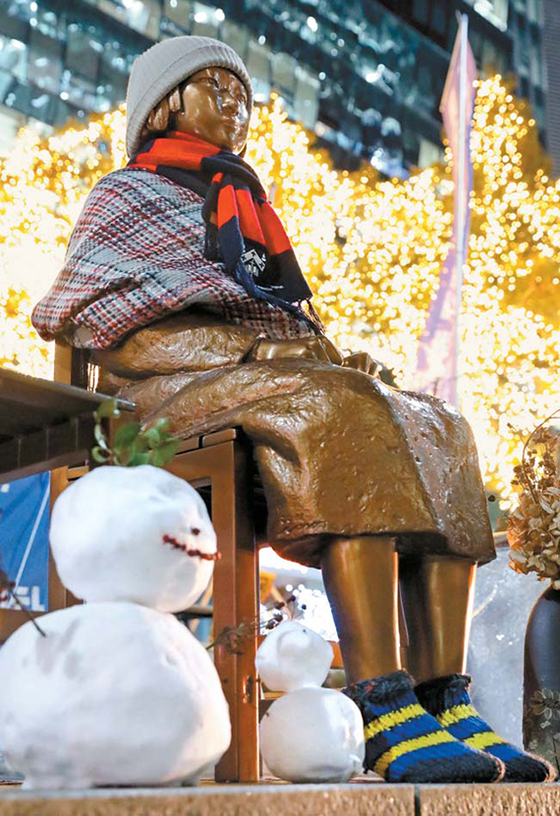On the 8th, a snowman stands next to the Statue of Peace Girl across from the former Japanese Embassy in Susong-dong, Seoul. On this day, the court issued the first ruling acknowledging the Japanese government’s responsibility to compensate the victims of comfort women. [뉴시스]
– The court first admitted the Japanese government’s liability for damages to the elderly victims of comfort women in the Japanese military. It has been 7 years since the lawsuit was filed with the Seoul Central District Court, starting with the petition for civil mediation in August 2013. It has been about 30 years since the late grandmother Kim Hak-soon, who first testified of the victims of Japanese military comfort women, filed an international lawsuit under the Tokyo District Law on December 6, 1991.
Central District Law “Pay 100 million per person”
Compensation ruling by the Japanese government following forced conscription
“Violation of international regulations, sovereignty exemption is difficult”
Japan’s “cannot accept” ambassadors to Japan rebelled against
– On the 8th, the 34th Division of the Civil Agreement of the Seoul Central District Court (President Judge Kim Jeong-gon) ruled in favor of the plaintiff in a lawsuit against the Japanese government by 12 people, including the late Chun-hee Bae, against the Japanese government. In October 2018, the Supreme Court recognized Japanese war criminals’ liability for compensation for victims of forced conscription, and the Japanese government also recognized the Japanese government’s liability for compensation for victims of Japanese military comfort women after three years.
The biggest issue in the comfort women case was whether or not the Korean court had judicial power because the defendant was from another country’s government. The judge said, “This case is considered to be a violation of international compulsory regulations as an anti-humanitarian act that was committed intentionally and systematically by the defendant.” You can exercise your jurisdiction.”
“The defendant’s illegal acts are recognized, and the plaintiffs seem to have suffered from extreme mental and physical pain that is hard to imagine.” “Considering that the plaintiffs did not receive compensation, the alimony was more than 100 million won each requested by plaintiffs. It makes sense,” he explained. “The defendant does not directly insist in this case, but if you look at the Korea-Japan Claims Agreement in 1965 or the Korea-Japan Comfort Women Agreement in 2015, it is difficult to say that the right to claim damages in this case was included.” Added.
This is the first time that a Korean court has admitted the Japanese government’s responsibility for compensation for damages for’comfort women’. It is in the same context as the conscription lawsuit in that the damage was recognized in the Korean court after losing four comfort women damage claims in Japan.
Immediately after the ruling, the Japanese Ministry of Foreign Affairs rebelled against Ambassador Nam Kwan-pyo. The Japanese government said, “We cannot accept this judgment of compensation” under the principle of “exemption of sovereignty” that states that under international law do not become defendants in other countries’ trials. It is a position that it will not even appeal in order to adhere to the principle of adaptation. This means that the judgment of compensation is highly likely to be confirmed by the defendant’s waiver of appeal.
If the Japanese government does not fulfill its liability, the plaintiff may go to the Japanese government to seize assets. After the previous ruling for compulsory conscription, the Daegu District Court’s Pohang Branch served an order for seizure of 8175 shares of PNR (PNR), an asset of Japan Steel (formerly Shinil Cheol Co., Ltd.) last month. However, attorney Kim Kang-won, who represented the victims of the comfort women for the seizure of assets, explained, “It is an issue that needs to be reviewed separately for the Japanese government to see if any assets can be enforced.”
It is also expected to have an impact on the relationship between Korea and Japan. It is pointed out that as long as the government adheres to the principle of non-intervention in the judiciary’s trial, as in the case of the judgment of compulsory conscription compensation, Korea-Japan relations will worsen. Kyodo News Agency predicted that Japan’s retaliation would be inevitable if the Korean court tried to seize assets by the Japanese government.
Local Japanese media reported that the plaintiff’s attempts to seize the Japanese embassy or possessions would violate the Vienna Convention on diplomatic relations. This is because Article 22 of the Vienna Convention stipulates that “furnishings and other property in the missions and areas shall be exempted from foreclosure or enforcement”.
Reporters Dr. Ra and Park Hyun-joo [email protected]
–


